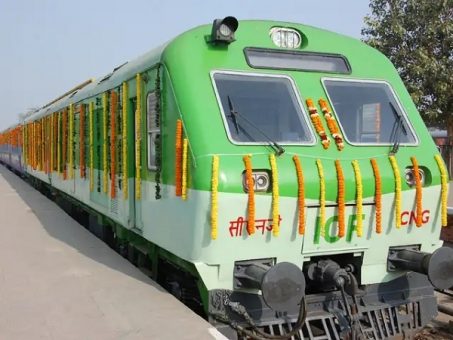Nigeria’s railway sector is set for a cost-saving turnaround as the Nigerian Railway Corporation (NRC) teams up with the Presidential Compressed Natural Gas Initiative (PCNGI) to convert its diesel-powered locomotives to cleaner, cheaper Compressed Natural Gas (CNG).

The Managing Director of the NRC, Dr. Kayode Opeifa, made this known during a media round in Lagos, where he outlined the new direction of the Corporation under President Bola Tinubu’s Renewed Hope Agenda.
Speaking at the Mobolaji Johnson Station in Yaba shortly after signing a Memorandum of Understanding (MoU) with PCNGI over the weekend, Opeifa described the CNG initiative as a “game changer” that will drastically cut running costs and reposition the rail sector for growth.
“When the president announced the subsidy removal on May 29, 2023, he had a vision for a gas revolution,” Opeifa said. “This partnership with PICNG is not just radical—it’s tremendous. It will cut our diesel costs by 70%, making rail transport more affordable and sustainable.”
The NRC, which currently spends billions annually on diesel for locomotives, generators, and stations, is banking on a dual-fuel model that blends 70% Liquefied Natural Gas (LNG) with 30% diesel. A successful proof-of-concept has already demonstrated viability, with potential fuel cost savings projected at over 60%, in line with federal projections.
Opeifa stressed that the shift to CNG would have a ripple effect on the economy by lowering transport costs, stimulating freight movement, and reducing inflationary pressure. “When we cut costs, we don’t just save money—we deliver economic benefits across the board,” he said.
The MoU with PCNGI, signed to mark President Tinubu’s second year in office, includes plans to establish CNG conversion centres at NRC facilities nationwide. The agreement will also leverage the NRC’s engineering expertise and expand technical training for young Nigerians.
Training schools in Ibadan, Enugu, Kafanchan, and Zaria will embed CNG conversion into their curriculum, with three-year programmes focused on developing a workforce ready for Nigeria’s energy transition. “Our engineers, including women, rebuilt a failed engine in just three days,” Opeifa proudly noted.
In addition to conversion works, NRC coaches will serve as mobile CNG awareness platforms. Pilot stations in gas-rich states like Oyo will distribute gas to commuters and small businesses, helping to deepen public adoption of clean energy alternatives.
The transition is also in line with Nigeria’s emission reduction goals, as the transport sector remains a key contributor to carbon emissions. “We’re not just cutting costs; we’re building a greener Nigeria,” Opeifa said.
The NRC boss also used the media round to provide updates on ongoing infrastructure projects. Under the Renewed Hope Agenda, the federal government has completed key sections such as the Port Harcourt–Aba line and extended the standard gauge from Lagos to Apapa Port, with plans to reach Tin Can Port soon.New standard gauge corridors, including Lagos–Abuja and Port Harcourt–Maiduguri, are being mapped, alongside state connectivity plans involving Akwa Ibom, Edo, Jigawa, and others.
“This government is the biggest investor in railway infrastructure. In the last decade alone, over 1,000km of new lines have been built, more than what we saw between 1960 and 2000,” he said.
Freight operations have also improved. Goods from Apapa Port are now moving seamlessly to Ibadan and beyond. He cited the AKK gas pipeline project as an example, where massive pipes were hauled from Warri to the North via rail, avoiding the risks of road transport.
However, the NRC is still grappling with persistent vandalism and infrastructure sabotage. Opeifa lamented the destruction of tracks in Lagos and washouts in Minna, urging Nigerians to see railway infrastructure as public property. “These are national assets, not scrap metal,” he said.
Despite the hurdles, he remained upbeat. Strategic partnerships with state governments—such as Lagos, Plateau, and Kaduna—under the Railing with the States initiative are helping to optimise track usage. In Lagos, the Red Line project is already sharing federal track space with the Lagos–Ibadan line.